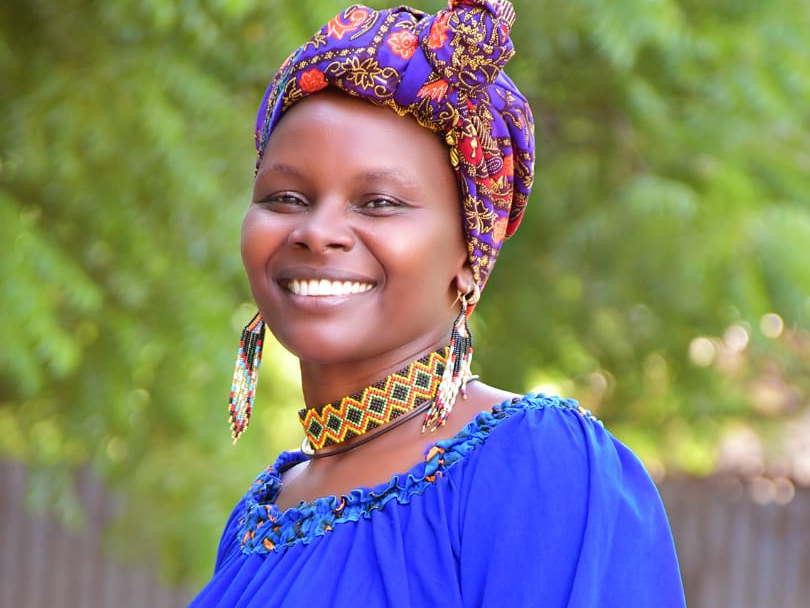The Kakuma Refugee Camp in northwestern Kenya is home to over 300,000 refugees. Many have fled conflicts and climate disasters in countries such as South Sudan, the Democratic Republic of Congo, Somalia, Burundi, Ethiopia, and even Afghanistan.
With schools, clinics, markets, and administrative zones, the vast settlement approximates the structure of a small city, with a group of local workers helping to run the gamut each day.
Among the humanitarian workers is 43-year-old Tabitha Maina, fondly called Tabby, with nearly two decades of experience in logistics, child protection, gender-based violence (GBV) response, and youth empowerment.
The second of four girls, Tabby grew up in Njoro, a town in Nakuru County in Kenya’s Rift Valley. She was just four years old when her mother passed away from post-surgery complications, leaving behind her young daughters in the care of their father.
But tensions erupted in the household after their father remarried, and the relationship between the children and their stepmother became strained. Before long, the girls became separated from their father, essentially raising each other. Tabby was only 11.
What they didn’t have in material wealth, they found in community. Tabby’s communal upbringing influenced her eventual career in humanitarian service. She attended primary and secondary schools under the Kenyan curriculum, excelling in mathematics and sciences, aspiring to be a teacher, and later considering a career in surgery.
She enrolled in Kenyatta University to study finance and accounting but discontinued studies in her second year due to family constraints. In 2002, Tabby moved with her aunt to Turkana County, in northwestern Kenya, where her career took a different turn.
At the time, Sudan was embroiled in conflict, and humanitarian agencies were expanding operations in northern Kenya. She promptly took on a logistical role to facilitate relief efforts for Sudanese refugees.
Tabby’s entry-level position at first involved cleaning in a makeshift office mostly. In time, she transitioned into a logistics assistant role, assisting with supply procurement and transportation logistics for humanitarian operations, especially chartered flights into South Sudan.
Later, she joined the Ecumenical Service for South Sudan, which helped to promote education, healthcare, and agriculture in the newly created country. Her responsibilities included organising transport and supplies for humanitarian teams, managing housing arrangements, and streamlining operations between Kenya and field sites in South Sudan.
In 2006, though, she stepped away from work to focus on her family. Three years later, she enrolled for a diploma in Supply Chain and Procurement to expand her experience in logistics, later working with the National Hospital as a supply chain assistant after graduation.
By 2014, Tabby was back in the humanitarian sector. She joined the Jesuit Refugee Service (JRS) in Kakuma as a facility manager, overseeing a residential compound used by humanitarian staff. In 2016, she switched to the JRS’s social protection programme, which focuses on gender-based violence prevention and response.
For three years, she worked as a matron in protection shelters that catered to domestic abuse survivors.
“We had children under the age of 12 dealing with traumas from exposure to GBV: secondary and primary trauma,” she recounted. “I needed the knowledge to support them more professionally.”
Moved by her experience in the shelters, Tabby took a diploma in Early Child Development Education. She wanted to understand the impacts of trauma on children in their formative years and how to help them recover effectively.
These days, Tabby works at the intersection of youth protection and economic inclusion. She coaches young refugees on vocational skills, digital learning, and entrepreneurship.
Her department also runs mentorship sessions, labour market information briefings, and psychosocial support for youth.
Within the Kakuma camp are five early-childhood schools, seven secondary schools, protection shelters for GBV survivors, and three higher education centres. The schools are open to both refugees and children from the host community. Jesuit priests assist in leading the refugees through the path of recovery.
Working with the displaced has shaped Tabby’s perspectives greatly. This understanding has also shaped how she views them—humans that are forcibly displaced from their homes by war, persecution, or political instability.
Yet, for Tabby, what is particularly striking is their resilience. She recounts stories of several who have risen above their circumstances to create meaningful benefits for their communities. One person is Hassan, a trained nurse who lost his credentials during flight. Tabby explained that Hassan works as a community health mobiliser, supporting vulnerable households and training others.
She recalled another refugee who runs a digital hub that allows his community youth to earn money from freelance projects and support their families.
“I heard previously that refugees are lazy and they love free things, but that is a wrong perception,” she says. “Many of them are skilled, entrepreneurial, and deeply committed to contributing. What they need is access, documentation, and opportunity.”
Owing to their displaced circumstances, refugees are often percieved to be poor or uneducated, a perception that diminishes their professional qualifications. “Refugees are not defined by their refugee status,” she adds.
Today several barriers confront many refugees in Kenya. Limited mobility is one notable challenge. Typically, refugees in Kenya require permits to move outside the camp, a process that is often slow and opaque. Because of this, many miss admission opportunities and conferences.
Tabby herself has supported several learners who couldn’t attend a fellowship or programme because of a lack of travel documents. For her, improving documentation processes would be a game-changer. She stressed that economic empowerment cannot happen without legal identity and the ability to move.
There’s also the problem of language. Coming from many different cultures, refugees in Kakuma are forced to learn English or Swahili to be integrated into Kenyan schools and services. The transition can be difficult for many, but some, particularly those born in Kenya, adapt quickly.
She remains optimistic amidst the challenges. Even as a mother of four. She continues to devote her time to the refugee camp and match her evolving roles with further learning. “I am a firm believer in continuous learning for self-development,” she says. “You can never pour from an empty vessel.”
Tabby’s life has come full circle. Working in one of the world’s most complex humanitarian settings, she marvels at how a child raised by a village has become a helper to many.
The Kakuma Refugee Camp in northwestern Kenya houses over 300,000 refugees from countries affected by conflict and climate disasters, such as South Sudan and Somalia. Resembling a small city, the camp includes schools, clinics, and markets, supported by a network of staff, including humanitarian workers like 43-year-old Tabitha Maina, also known as Tabby. With a background in logistics, child protection, and gender-based violence response, Tabby has spent nearly two decades working within the humanitarian sector. She grew up in Kenya's Rift Valley, with a challenging family background that ingrained in her a communal spirit, guiding her career path.
Tabby initially worked in logistics for humanitarian operations during the Sudanese conflict, managing transport and supplies. After focusing on her family, she broadened her experience with a diploma in Supply Chain and Procurement, later rejoining the humanitarian sector. She now focuses on youth protection and economic inclusion in the Kakuma camp, promoting vocational skills and entrepreneurship among young refugees. Her work also emphasizes gender-based violence prevention and offers psychosocial support to abuse survivors.
Tabby highlights the resilience and potential of refugees who, despite challenging circumstances, often become skilled contributors to their community. She advocates for improved mobility and documentation to unlock economic opportunities for refugees, rejecting common stereotypes of refugees as unskilled or dependent on aid. Despite facing challenges such as language barriers and restricted mobility for refugees, Tabby remains dedicated to her work in Kakuma, emphasizing continuous learning and empowerment. Her journey reflects her commitment to helping others, rooted in her own experiences of overcoming adversity.






